- College Essay
- Argumentative Essay
- Expository Essay
- Narrative Essay
- Descriptive Essay
- Scholarship Essay
- Admission Essay
- Reflective Essay
- Nursing Essay
- Economics Essay
Assignments
- Term Papers
- Research Papers
- Case Studies
- Dissertation
- Presentation
- Write My Assignment
- Editing Help
- Cheap Essay Writing
- How to Order
Rhetorical Analysis Essay
Rhetorical Analysis Essay Example

Rhetorical Analysis Essay Example - Free Samples
11 min read

People also read
Rhetorical Analysis Essay - A Complete Guide With Examples
320+ Best Rhetorical Analysis Essay Topics
Crafting an Effective Rhetorical Analysis Essay Outline - Free Samples!
Ethos, Pathos, and Logos - Structure, Usage & Examples
Many students find themselves confused by rhetorical strategies, which often leads to essays that miss the mark. The good news is there's an easy fix: using great examples.
By looking at high-quality rhetorical analysis essay examples, you can learn what works and improve your own writing.
That’s why we’ve compiled some top-notch rhetorical analysis essay examples to boost your understanding of how to write a compelling and well-structured essay.
So, let’s explore these examples!
- 1. Good Rhetorical Analysis Essay Example
- 2. Rhetorical Analysis Essay Examples for Students
- 3. Writing a Visual Rhetorical Analysis Essay with Example
- 4. Rhetorical Analysis Essay Writing Tips
Good Rhetorical Analysis Essay Example
The step-by-step writing process of a rhetorical analysis essay is far more complicated than ordinary academic essays. This essay type critically analyzes the rhetorical means used to persuade the audience and their efficiency.
The example provided below is the best rhetorical analysis essay example:
Rhetorical Analysis Essay Sample
In this essay type, the author uses rhetorical approaches such as ethos, pathos, and logos . These approaches are then studied and analyzed deeply by the essay writers to weigh their effectiveness in delivering the message.
Let’s take a look at the following example to get a better idea;
The outline and structure of a rhetorical analysis essay are important.
According to the essay outline, the essay is divided into three sections:
- Introduction
- Ethos
- Logos
A rhetorical analysis essay outline follows a traditional essay outline. Here’s how each part is typically written:
Rhetorical Analysis Introduction Example
An introduction for a rhetorical essay is drafted by:
- Stating an opening sentence known as the hook . This catchy sentence is prepared to grab the audience’s attention to the paper.
- After the opening sentence, the background information of the author and the original text are provided.
For example, a rhetorical analysis essay written by Lee Jennings on“The Right Stuff” by David Suzuki. Lee started the essay by providing the introduction in the following way:
Analysis of the Example:
- Suzuki stresses the importance of high school education. He prepares his readers for a proposal to make that education as valuable as possible.
- A rhetorical analysis can show how successful Suzuki was in using logos, pathos, and ethos. He had a strong ethos because of his reputation.
- He also used pathos to appeal to parents and educators. However, his use of logos could have been more successful.
- Here Jennings stated the background information about the text and highlighted the rhetorical techniques used and their effectiveness.
Thesis Statement Example for Rhetorical Analysis Essay
A thesis statement of a rhetorical analysis essay is the writer’s stance on the original text. It is the argument that a writer holds and proves it using the evidence from the original text.
A thesis statement for a rhetorical essay is written by analyzing the following elements of the original text:
- Diction - It refers to the author’s choice of words and the tone
- Imagery - The visual descriptive language that the author used in the content.
- Simile - The comparison of things and ideas
In Jennings's analysis of “The Right Stuff,” the thesis statement was:
Example For Rhetorical Analysis Thesis Statement
Rhetorical Analysis Body Paragraph Example
In the body paragraphs of your rhetorical analysis essay, you dissect the author's work. Each body paragraph opens with a topic sentence that shows the main point of that paragraph.
This is where you present the main analysis of their rhetorical techniques, and provide evidence to support your analysis.
Let's look at an example that analyzes the use of ethos in David Suzuki's essay:
Rhetorical Analysis Conclusion Example
All the body paragraphs lead the audience towards the essay’s conclusion .
Here is the conclusion for rhetorical analysis essay example by Jennings:
In the conclusion section, Jennings summarized the major points and restated the thesis statement to prove them.
Rhetorical Essay Example For The Right Stuff by David Suzuki
Rhetorical Analysis Essay Examples for Students
Writing a rhetorical analysis for AP Language and Composition courses can be challenging. Here are some AP English language rhetorical analysis essay examples:
AP Language Rhetorical Essay Sample
AP Rhetorical Analysis Essay Template
Rhetorical Analysis Essay Example AP Lang
AP Lang Rhetorical Analysis Essay Example
Here are a few more rhetorical analysis essay examples pdfs to help students:
Rhetorical Analysis Essay Example Ethos, Pathos, Logos
Rhetorical Analysis Essay Example Outline
Rhetorical Analysis Essay Example College
Rhetorical Analysis Essay Example APA Format
Compare and Contrast Rhetorical Analysis Essay Example
Comparative Rhetorical Analysis Essay Example
How to Start Rhetorical Analysis Essay Example
Rhetorical Analysis Essay Example High School
Rhetorical Analysis Essay Example APA Sample
Rhetorical Analysis Essay Example Of a Song
Florence Kelley Speech Rhetorical Analysis Essay Example
Rhetorical Analysis Essay Example MLA
Writing a Visual Rhetorical Analysis Essay with Example
The visual rhetorical analysis essay determines how pictures and images communicate messages and persuade the audience.
Usually, visual rhetorical analysis papers are written for advertisements. This is because they use strong images to convince the audience to behave in a certain way.
To draft a perfect visual rhetorical analysis essay, follow the tips below:
- Analyze the advertisement deeply and note every minor detail.
- Notice objects and colors used in the image to gather every detail.
- Determine the importance of the colors and objects and analyze why the advertiser chose the particular picture.
- See what you feel about the image.
- Consider the objective of the image. Identify the message that the image is portraying.
- Identify the targeted audience and how they respond to the picture.
An example is provided below to give students a better idea of the concept.
Simplicity Breeds Clarity Visual Rhetorical Analysis Essay Example
Rhetorical Analysis Essay Writing Tips
Follow the tips provided below to make your rhetorical writing compelling.
- Choose an engaging topic for your essay. The rhetorical analysis essay topic should be engaging to grab the reader’s attention.
- Thoroughly read the original text.
- Identify the SOAPSTone. From the text, determine the speaker, occasions, audience, purpose, subject, and tone.
- Develop a thesis statement to state your claim over the text.
- Draft a rhetorical analysis essay outline.
- Write an engaging essay introduction by giving a hook statement and background information. At the end of the introductory paragraph, state the thesis statement.
- The body paragraphs of the rhetorical essay should have a topic sentence. Also, in the paragraph, a thorough analysis should be presented.
- For writing a satisfactory rhetorical essay conclusion, restate the thesis statement and summarize the main points.
- Proofread your essay to check for mistakes in the content. Make your edits before submitting the draft.
All in all,
Following the tips and the correct writing procedure will guarantee success in your academics.
We’ve provided plenty of examples of a rhetorical analysis essay. But if you’re still struggling to draft a great rhetorical analysis essay, it’s a good idea to seek professional help.
MyPerfectWords.com can assist with all your academic assignments. Our analytical essay writing service is ready to help if you’re confused about your writing assignments or struggling to meet a deadline.
Feel free to place your ' Just do my essay ' request and hire our serivces today at the most reasonable prices.

Write Essay Within 60 Seconds!

Nova Allison is a Digital Content Strategist with over eight years of experience. Nova has also worked as a technical and scientific writer. She is majorly involved in developing and reviewing online content plans that engage and resonate with audiences. Nova has a passion for writing that engages and informs her readers.
Struggling With Your Paper?
Get a custom paper written at
With a FREE Turnitin report, and a 100% money-back guarantee
LIMITED TIME ONLY!
Keep reading
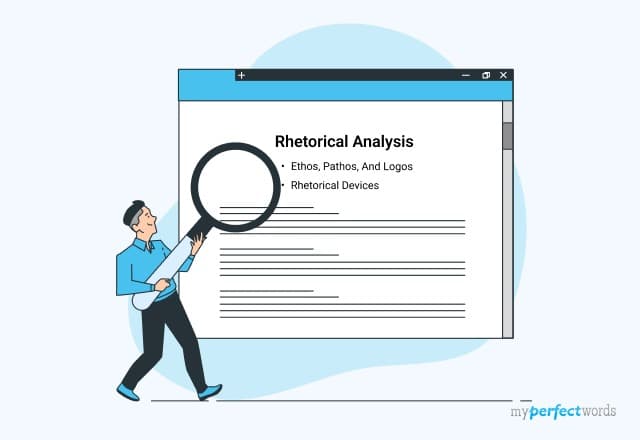
OFFER EXPIRES SOON!
Rhetorical Analysis Sample Essay
Harriet Clark
Ms. Rebecca Winter
13 Feb. 2015
Not Quite a Clean Sweep: Rhetorical Strategies in
Grose's "Cleaning: The Final Feminist Frontier”
A woman’s work is never done: many American women grow up with this saying and feel it to be true. 1 One such woman, author Jessica Grose, wrote “Cleaning: The Final Feminist Frontier,” published in 2013 in the New Republic, 2 and she argues that while the men recently started taking on more of the childcare and cooking, cleaning still falls unfairly on women. 3 Grose begins building her credibility with personal facts and reputable sources, citing convincing facts and statistics, and successfully employing emotional appeals; however, toward the end of the article, her attempts to appeal to readers’ emotions weaken her credibility and ultimately, her argument. 4
In her article, Grose first sets the stage by describing a specific scenario of house-cleaning with her husband after being shut in during Hurricane Sandy, and then she outlines the uneven distribution of cleaning work in her marriage and draws a comparison to the larger feminist issue of who does the cleaning in a relationship. Grose continues by discussing some of the reasons that men do not contribute to cleaning: the praise for a clean house goes to the woman; advertising and media praise men’s cooking and childcare, but not cleaning; and lastly, it is just not fun. Possible solutions to the problem, Grose suggests, include making a chart of who does which chores, dividing up tasks based on skill and ability, accepting a dirtier home, and making cleaning more fun with gadgets. 5
Throughout her piece, Grose uses many strong sources that strengthen her credibility and appeal to ethos, as well as build her argument. 6 These sources include, “sociologists Judith Treas and Tsui-o Tai,” “a 2008 study from the University of New Hampshire,” and “P&G North America Fabric Care Brand Manager, Matthew Krehbiel” (qtd. in Grose). 7 Citing these sources boosts Grose’s credibility by showing that she has done her homework and has provided facts and statistics, as well as expert opinions to support her claim. She also uses personal examples from her own home life to introduce and support the issue, which shows that she has a personal stake in and first-hand experience with the problem. 8
Adding to her ethos appeals, Grose uses strong appeals to logos, with many facts and statistics and logical progressions of ideas. 9 She points out facts about her marriage and the distribution of household chores: “My husband and I both work. We split midnight baby feedings ...but ... he will admit that he’s never cleaned the bathroom, that I do the dishes nine times out of ten, and that he barely knows how the washer and dryer work in the apartment we’ve lived in for over eight months.” 10 These facts introduce and support the idea that Grose does more household chores than her husband. Grose continues with many statistics:
[A]bout 55 percent of American mothers employed full time do some housework on an average day, while only 18 percent of employed fathers do. ... [W]orking women with children are still doing a week and a half more of “second shift” work each year than their male partners. ... Even in the famously gender-neutral Sweden, women do 45 minutes more housework a day than their male partners. 11
These statistics are a few of many that logically support her claim that it is a substantial and real problem that men do not do their fair share of the chores. The details and numbers build an appeal to logos and impress upon the reader that this is a problem worth discussing. 12
Along with strong logos appeals, Grose effectively makes appeals to pathos in the beginning and middle sections. 13 Her introduction is full of emotionally-charged words and phrases that create a sympathetic image; Grose notes that she “was eight months pregnant” and her husband found it difficult to “fight with a massively pregnant person.” 14 The image she evokes of the challenges and vulnerabilities of being so pregnant, as well as the high emotions a woman feels at that time effectively introduce the argument and its seriousness. Her goal is to make the reader feel sympathy for her. Adding to this idea are words and phrases such as, “insisted,” “argued,” “not fun,” “sucks” “headachey,” “be judged,” “be shunned” (Grose). All of these words evoke negative emotions about cleaning, which makes the reader sympathize with women who feel “judged” and shunned”—very negative feelings. Another feeling Grose reinforces with her word choice is the concept of fairness: “fair share,” “a week and a half more of ‘second shift’ work,” “more housework,” “more gendered and less frequent.” These words help establish the unfairness that exists when women do all of the cleaning, and they are an appeal to pathos, or the readers’ feelings of frustration and anger with injustice. 15
However, the end of the article lacks the same level of effectiveness in the appeals to ethos. 16 For example, Grose notes that when men do housework, they are considered to be “’enacting “small instances of gender heroism,” or ‘SIGH’s’—which, barf.” 17 The usage of the word “barf” is jarring to the reader; unprofessional and immature, it is a shift from the researched, intelligent voice she has established and the reader is less likely to take the author seriously. This damages the strength of her credibility and her argument. 18
Additionally, her last statement in the article refers to her husband in a way that weakens the argument. 19 While returning to the introduction’s hook in the conclusion is a frequently-used strategy, Grose chooses to return to her discussion of her husband in a humorous way: Grose discusses solutions, and says there is “a huge, untapped market ... for toilet-scrubbing iPods. I bet my husband would buy one.” 20 Returning to her own marriage and husband is an appeal to ethos or personal credibility, and while that works well in the introduction, in the conclusion, it lacks the strength and seriousness that the topic deserves and was given earlier in the article. 21
Though Grose begins the essay by effectively persuading her readers of the unfair distribution of home-maintenance cleaning labor, she loses her power in the end, where she most needs to drive home her argument. Readers can see the problem exists in both her marriage and throughout the world; however, her shift to humor and sarcasm makes the reader not take the problem as seriously in the end. 22 Grose could have more seriously driven home the point that a woman’s work could be done: by a man. 23
Works Cited
Grose, Jessica. “Cleaning: The Final Feminist Frontier.” New Republic. The New Republic, 19 Mar. 2013. Web. 28 Mar. 2014.
- Article author's claim or purpose
- Summary of the article's main point in the second paragraph (could also be in the introduction)
- Third paragraph begins with a transition and topic sentence that reflects the first topic in the thesis
- Quotes illustrate how the author uses appeals to ethos
- Analysis explains how the quotes show the effective use of ethos as noted in the thesis
- Transition and topic sentence about the second point from the thesis
- Quote that illustrates appeals to logos
- Analysis explains how the quotes show the effective use of logos, as noted in the thesis
- Transition and topic sentence about the third point from the thesis
- Quotes that illustrate appeals to pathos
- Analysis explains how the quotes show the effective use of pathos, as noted in the thesis
- Transition and topic sentence about fourth point from the thesis
- Quote illustrates how the author uses appeal to ethos
- Analysis explains how quote supports thesis
- Transition and topic sentence about fourth point from thesis
- Conclusion returns to the ideas in the thesis and further develops them
- Last sentence returns to the hook in the introduction
Learn more about the " Rhetorical Analysis Graphic Organizer ."
Learn more about " Pathos, Logos, and Ethos ."
Rhetorical Analysis Essay
Rhetorical Analysis Essay Example

Top 15+ Rhetorical Analysis Essay Examples for Students
Published on: Mar 10, 2023
Last updated on: Oct 26, 2024

People also read
How To Write A Rhetorical Analysis Essay That Stands Out
List of 200+ Rhetorical Analysis Essay Topics [With Tips]
Rhetorical Analysis Essay Outline - Tips & Examples
Understanding Ethos, Pathos, Logos - The Three Rhetorical Appeals
Share this article
Writing a rhetorical analysis essay can be tough. You want to engage your reader, but you also need to provide clear and concise analysis of the text.
It's hard to know where to start, what information is important, and how to make your argument clear.
Don't fret! We've got you covered.
In this blog post, we'll give you 15+ Rhetorical analysis essay examples to help you craft a winning essay. Plus, we'll give you some tips on how to make your essay stand out.
So without a further delay, let's start!
On This Page On This Page -->
Good Rhetorical Analysis Essay Examples
When writing a rhetorical essay , examples help the readers to understand things in a better way. They also help a writer to compose an essay just like professionals.
Here are some amazing rhetorical analysis examples on different topics. Use them as a helping hand to understand the concept and write a good essay.
Rhetorical Analysis Essay Example: AP Language
Rhetorical analysis done in AP Language and Composition is one of the biggest tasks a student can ever get. On the same hand, drafting it in a proper way is also necessary to get good grades.
Look at these rhetorical analysis essay example AP language given below to see how a well-written rhetorical essay is written.
AP Rhetorical analysis essay example
Rhetorical Analysis Essay Example Ap Lang 2020
Rhetorical Analysis Essay Example Ap Lang 2021
Rhetorical Analysis Essay Example AP Lang 2022
Rhetorical Analysis Essay Example AP Lang 2023
These rhetorical analysis essay example college board will help you to win over your panel in no time!
Rhetorical Analysis Essay Example: Ted Talk
A rhetorical analysis can be done on nearly anything. Here is a good example of a rhetorical essay in which a ted talk is being analyzed.
Rhetorical Analysis Essay Example: Ethos, Pathos, Logos
The first impression of these three terms sounds just like a conjuration in some kind of a magical story. But in fact, these elements of persuasion were created by Aristotle and have been used for a very long time.
According to Aristotle, they were the primary persuasive strategies that authors should use in their papers. These elements are further elaborated as follows:
- The ethos appeals to ethics.
- Pathos appeals to emotions.
- Logos mean the use of rational thinking.
Here is an example of a rhetorical essay written using these elements.
Understand Ethos,Pathos and Logos to write a compelling essay.
Rhetorical Analysis Essay Example for College
College students often get to write a rhetorical analysis essay. They find it hard to write such an essay because it is a bit more technical than other essay types.
Here is an example of a well-written rhetorical essay for college students.
Comparative Rhetorical Analysis Essay Example
A rhetorical analysis essay can be written to show a comparison between two objects. Here is a compare-and-contrast rhetorical analysis essay example.

Paper Due? Why Suffer? That's our Job!
Visual Rhetorical Analysis Essay Example
The visual rhetorical essay determines how pictures and images communicate messages and persuade the audience. Usually, visual rhetorical essays are written for advertisements. They use strong images to convince the audience to behave in a certain way.
Visual Rhetorical Analysis Essay Example Pdf
Rhetorical Analysis Essay Example: Letter from Birmingham Jail
Here is another good example of a rhetorical essay. Most of us know about the history of “letter from a Birmingham jail”. Read the given example to see how rhetorical analysis is done on it.
Struggling for a similar good topic? Check out our amazing rhetorical essay topics to select the perfect theme for your essay.
Great Influenza: Rhetorical Analysis Essay Example
Influenza has been one of the scariest pandemics the world has faced in history. Here is a rhetorical essay on great influenza.
Great influenza: Rhetorical Analysis Essay Example
Condoleezza Rice Rhetorical Analysis Essay Example
The speech given by Condoleezza Rice has become a classic example of effective oratory. Here is an example of a rhetorical analysis essay on the speech given by Condoleezza Rice at a commencement ceremony.
Rhetorical Analysis Essay Example: Condoleezza Rice’s Commencement Speech
This example explores the effectiveness of Rice's speech and features an in-depth analysis.
Rhetorical Analysis Essay Example High School
High school essays involve the analysis of different texts and the application of rhetorical tools to those texts. Here is an example that focuses on a high school essay about the effects of television on society.
Rhetorical Analysis Essay Example (Pdf)
Rhetorical Analysis Essay Example MLA
MLA format is one of the most commonly used formats for essays. Here is an example of a rhetorical essay written in MLA format that focuses on the effectiveness of advertisements.
MLA Rhetorical Analysis Essay PDF
Rhetorical Analysis Essay Example Outline
Outline helps to organize the ideas and arguments that you want to present in your essay. Here is a sample outline that can help you write an effective rhetorical analysis essay.
Rhetorical Analysis Essay Example Outline sample
Hop on to our rhetorical essay outline guide to learn the step-by-step process of crafting an exemplary outline.
How to Start a Rhetorical Analysis Essay Example
When starting a rhetorical analysis essay, it is important to provide a brief overview of the topic that you are analyzing. This should include the overall message being conveyed, the target audience and the rhetorical devices used in the text.
Here is a rhetorical analysis introduction example for your ease.
Thesis Statement Example for Rhetorical Analysis Essay
The thesis statement of a rhetorical analysis essay should explain the primary argument being made in the text. Here is an example of a thesis statement for a rhetorical analysis essay for your ease.
Example of Rhetorical Analysis Thesis Statement
Rhetorical Analysis Essay Example Conclusion
The conclusion of a rhetorical analysis essay is an important part of the overall essay. It should summarize your main points and provide some final thoughts on the topic.
Here is an example of conclusion for a rhetorical analysis essay for your ease.
Download this Rhetorical Analysis Essay Writing Manual to help gather all the relevant guidance for your rhetorical essay.
Rhetorical Analysis Essay Writing Manual (PDF)
Watch this video to understand how to select Rhetorical analysis essay evidences.
Rhetorical Analysis Essay Writing Tips
To write a rhetorical analysis essay, you must have good writing skills. Writing a rhetorical essay is a technical task to do. This is why many students find it really difficult.
There are the following things that you should do to write a good rhetorical analysis essay. Those important things are as follows:
- Determine the Rhetorical Strategy
To write a rhetorical essay, the writer needs to follow a specific method for research. The typical research methods used for this particular essay are as follows:
- Choose a Topic
For any essay type, it is very important to have a good topic. A good topic seeks the readers of attention and convinces them to read the complete essay.
- Create a Rhetorical Analysis Outline
An outline is an essential part of essay writing. The outline provides a definite structure to the essay and also guides the reader throughout the essay. A rhetorical analysis outline has the following elements in it:
- Introduction
- Body paragraphs
These three elements let you describe the entire idea of your rhetorical analysis essay. These three elements are further written with the help of sub-elements.
- Develop a Thesis Statement
The thesis statement is yet another important part of essay writing. It is the essence of the entire essay. It may be a sentence or two explaining the whole idea of your essay. However, not give background information about the topic.
- Proofread and Edit
The formal terminology used for essay revision is known as proofreading. To make sure that your essay is error-free, repeat this process more than once.
Now let's wrap up , shall we?
So far we have provided you with the best rhetorical analysis examples that are sure to win over your panel. With our help, you can surely sfe guard your academic success journey in no time!
In case you think you can not write such an essay on your own, consult an essay writing service.
At CollegeEssay.org , we provide the best rhetorical analysis essay writing service to every student. We have an extensive team of professional writers who can handle all your essay writing assignments.
We make sure that the content we provide you is 100% unique and help you get the best grade.
So why delay when our essay writer can provide you with a top-notch rhetorical essay right away?
Hire our essay service and avail yourself 50% OFF on your first order today!
Frequently Asked Questions
What are the 3 parts of rhetorical analysis.
The three parts of rhetorical analysis are:
- Ethos
- Logos
- Pathos
What are the elements of a rhetorical analysis?
The main elements of a rhetorical analysis essay are:
- Situation
- Audience
- Purpose
- Medium
- Context
Is there any difference between AP lang rhetorical analysis essay example 2020 and AP lang rhetorical analysis essay example 2021?
Yes, there are differences between 2020 and 2021 AP Language and Composition rhetorical analysis essay examples.
- In 2020 the essay prompts revolved around various social issues related to public discourse. In 2021 they mainly focused on the ideas of justice or progress.
- In 2020 students were encouraged to write a multi-paragraph essay shifting back and forth between creative devices of rhetoric. While in 2021 more emphasis was placed on analyzing how well an author's argument is structured.
Cathy A. (Literature, Marketing)
For more than five years now, Cathy has been one of our most hardworking authors on the platform. With a Masters degree in mass communication, she knows the ins and outs of professional writing. Clients often leave her glowing reviews for being an amazing writer who takes her work very seriously.
Need Help With Your Essay?
Also get FREE title page, Turnitin report, unlimited revisions, and more!
Keep reading

50% OFF ON CUSTOM ESSAYS
Essay Services
- Argumentative Essay Service
- Descriptive Essay Service
- Persuasive Essay Service
- Narrative Essay Service
- Analytical Essay Service
- Expository Essay Service
- Comparison Essay Service
Writing Help
- Term Paper Writing Help
- Research Writing Help
- Thesis Help
- Dissertation Help
- Report Writing Help
- Speech Writing Help
- Assignment Help
Legal & Policies
- Privacy Policy
- Cookies Policy
- Terms of Use
- Refunds & Cancellations
- Our Writers
- Success Stories
- Our Guarantees
- Affiliate Program
- Referral Program
Disclaimer: All client orders are completed by our team of highly qualified human writers. The essays and papers provided by us are not to be used for submission but rather as learning models only.

Rhetorical Analysis Essay
Rhetorical analysis essay generator.

Students and people need to know how to analyze and break down other people’s speeches and non-fiction works, books , advertisements , and brochures . One can apply the scientific method to dissect the various structures, elements , and characteristics of one’s work. A student or an academic can do this through a rhetorical analysis essay.
1. Rhetorical Analysis Essay Example
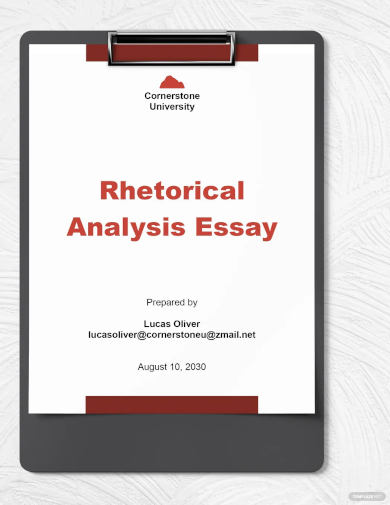
- Google Docs
2. Rhetorical Analysis Thesis Statement Essay Example
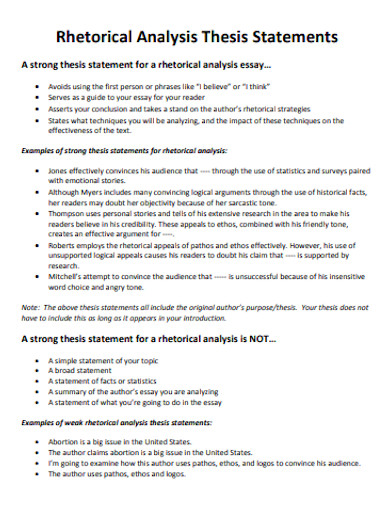
Size: 342 KB
3. Rhetorical Analysis of a Speech Essay Example
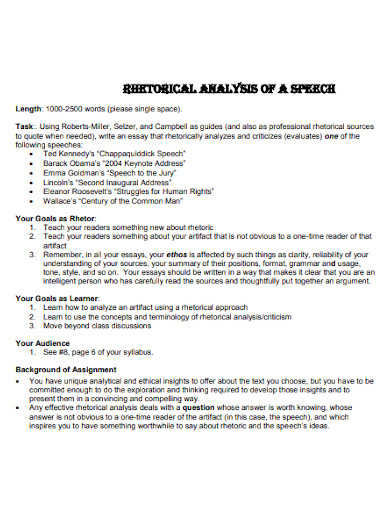
Size: 610 KB
4. Critical Rhetorical Analysis Essay Example
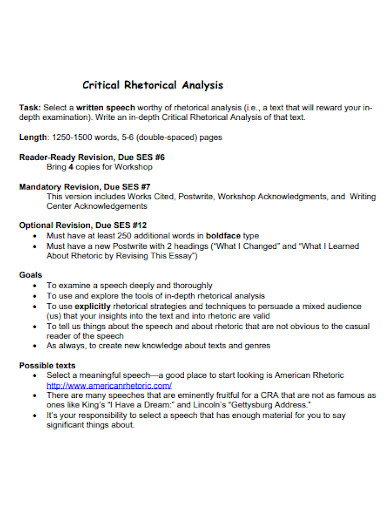
Size: 74 KB
5. Structure of Rhetorical Analysis Essay Example
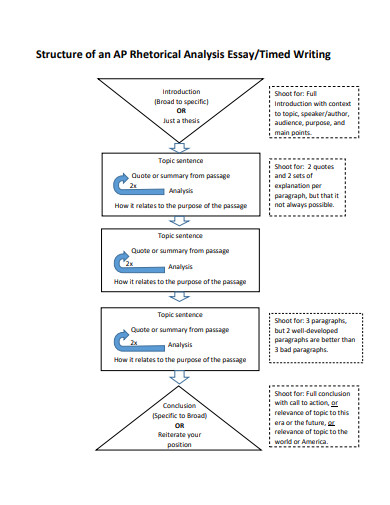
Size: 315 KB
6. Editable Rhetorical Analysis Essay Example
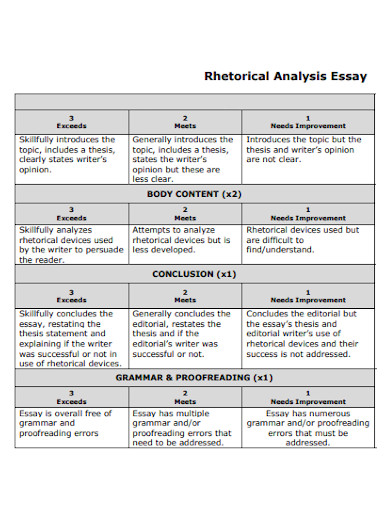
Size: 133 KB
7. Organizing Rhetorical Analysis Essay Example
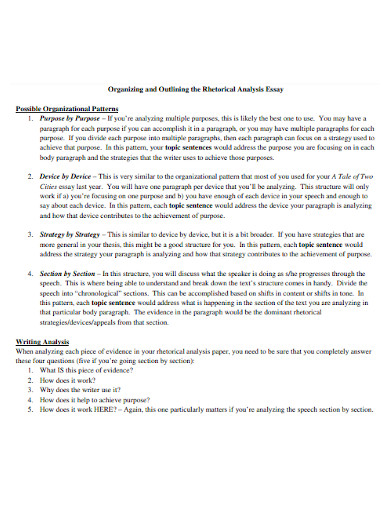
Size: 23 KB
8. Rhetorical Analysis Essay Outline Example
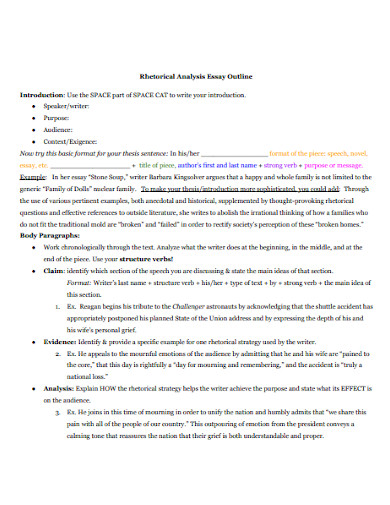
Size: 60 KB
9. Rhetorical Analysis Essay Conclusion Example
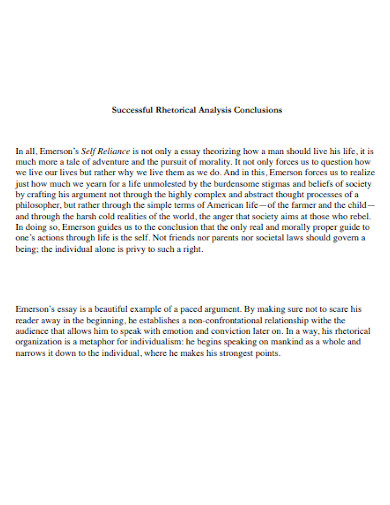
Size: 45 KB
10. Printable Rhetorical Analysis Essay Example
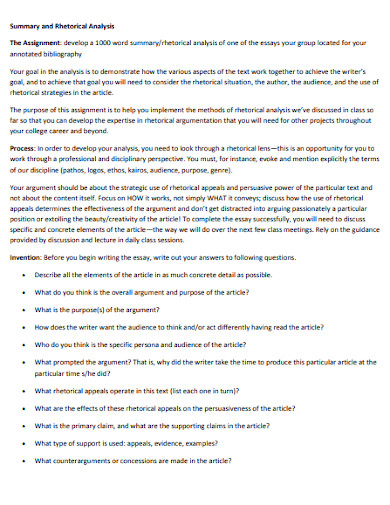
Size: 182 KB
111. Sample Rhetorical Analysis Essay Example
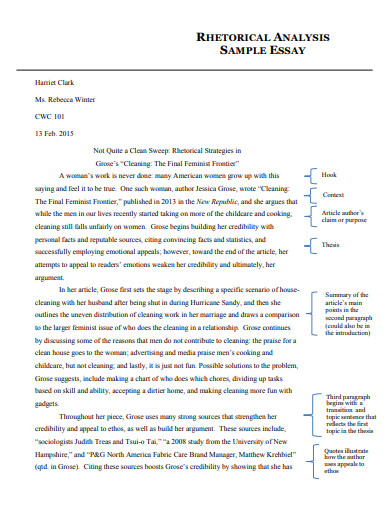
Size: 341 KB
12. Rhetorical Analysis Essay Assignment Example
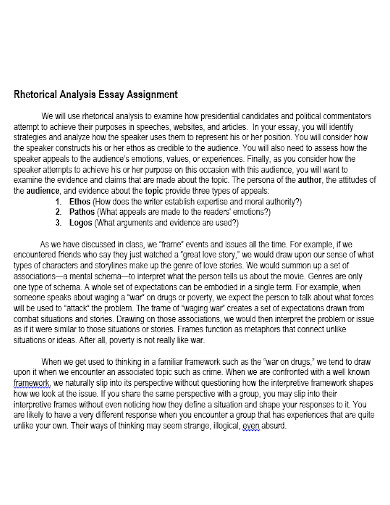
Size: 93 KB
13. AP English Rhetorical Analysis Essay Example
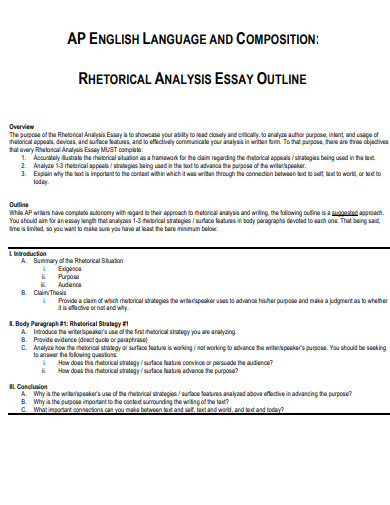
Size: 53 KB
14. College Rhetorical Analysis Essay Example
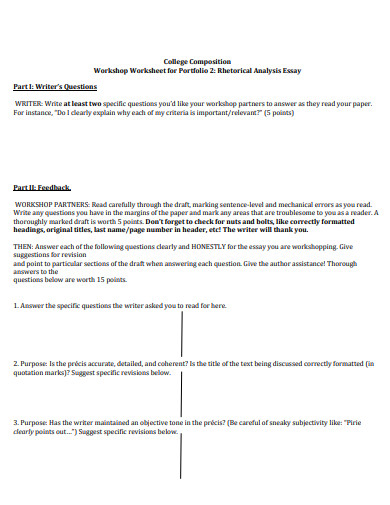
Size: 311 KB
15. Rhetorical Analysis Essay Advertisement Example
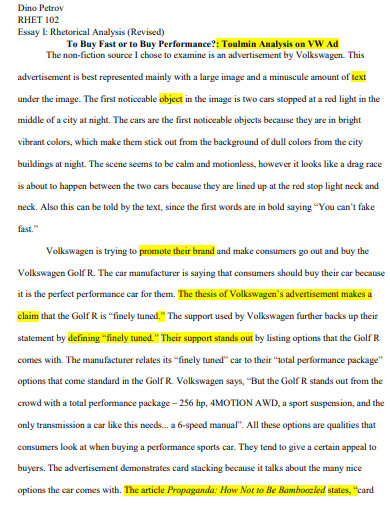
Size: 316 KB

16. Rhetorical Analysis Essay MLA Format
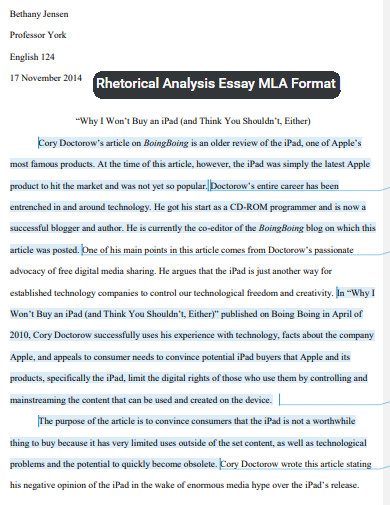
Size: 108 KB
17. Rhetorical Analysis Essay Ethos Example
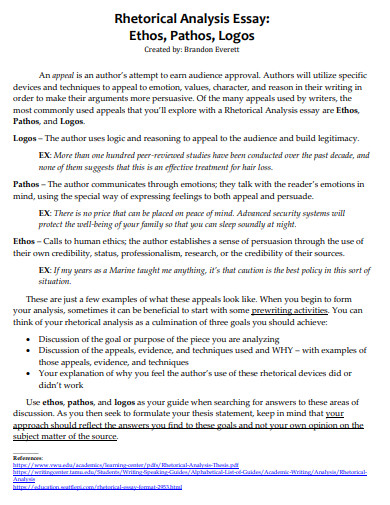
Size: 544 KB
18. Writing a Rhetorical Analysis Essay Example
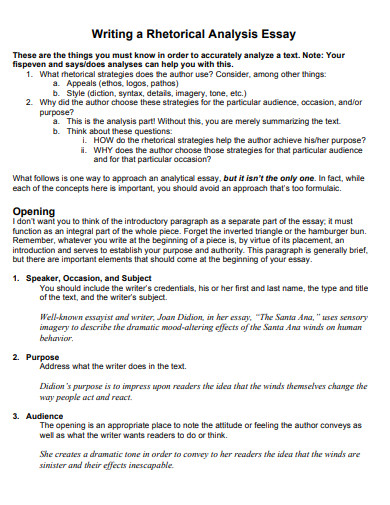
Size: 227 KB
19. Simple Rhetorical Analysis Essay Example
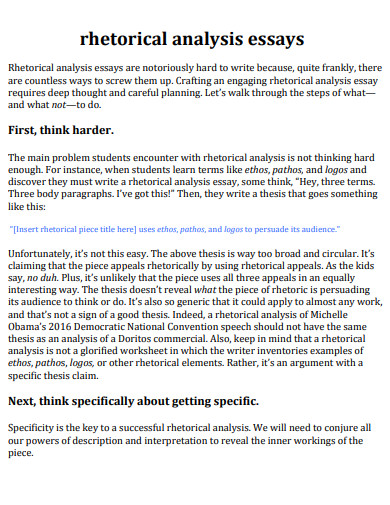
20. Rhetorical Analysis Essay Format
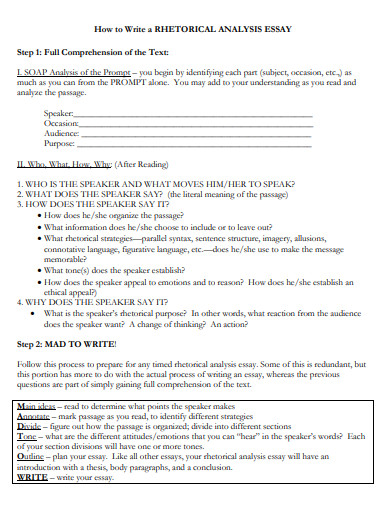
Size: 303 KB
21. Commercial Rhetorical Analysis Essay Example
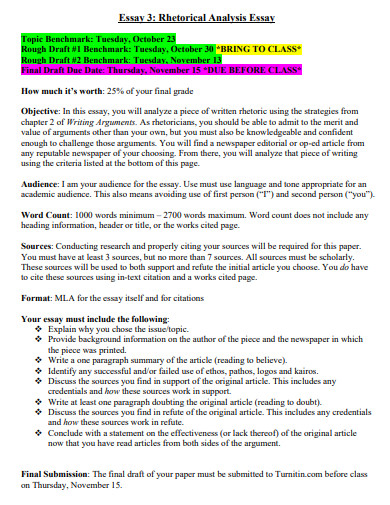
Size: 19 KB
22. Draft Rhetorical Analysis Essay Example
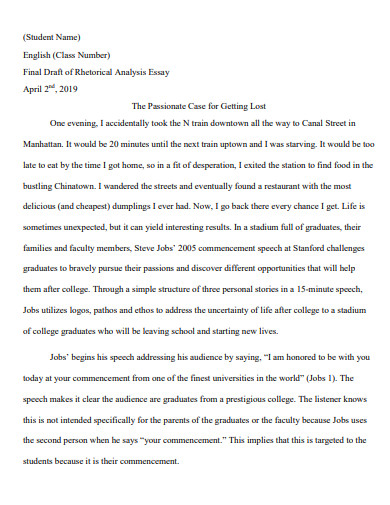
Size: 194 KB
23. Pathos Rhetorical Analysis Essay Example
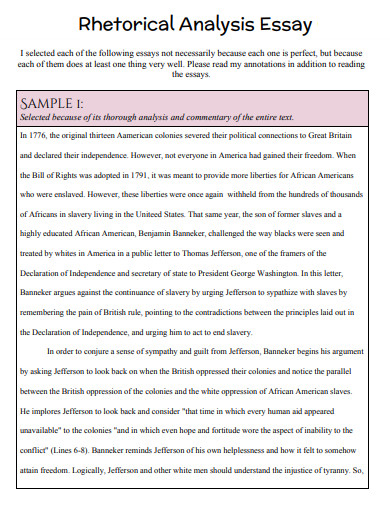
Size: 437 KB
24. Basic Rhetorical Analysis Essay Example
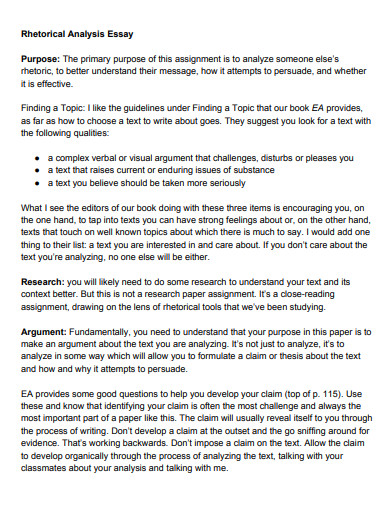
Size: 112 KB
25. General Rhetorical Analysis Essay Example
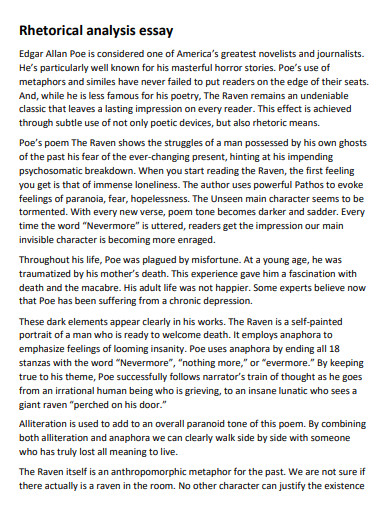
Size: 82 KB
26. Formal Rhetorical Analysis Essay Example
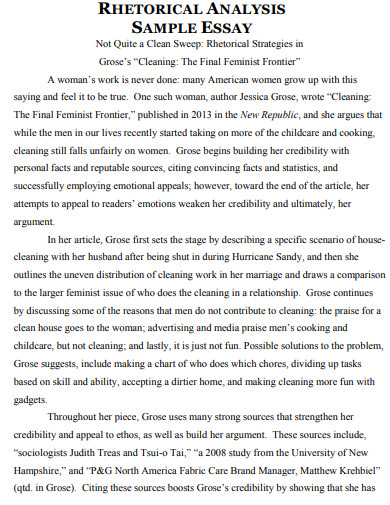
27. Rhetorical Analysis Essay Paper Example
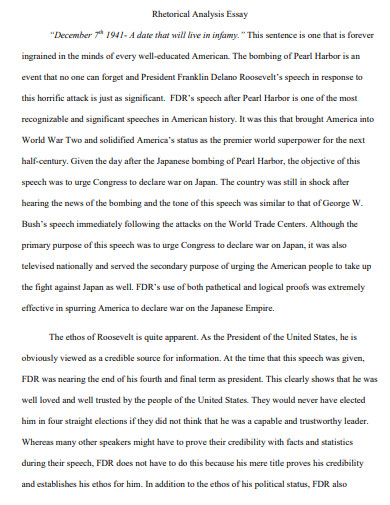
Size: 35 KB
28. Rhetorical Analysis Paragraphs and Essay Example
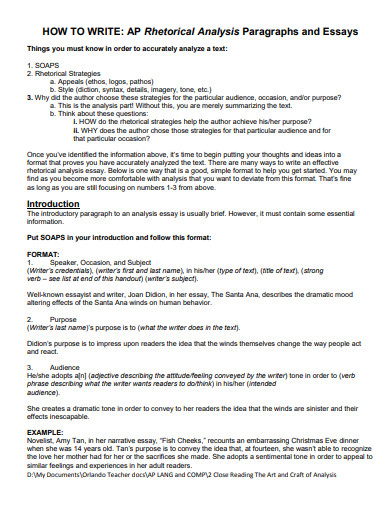
Size: 241 KB
29. Rhetorical Analysis of Examination Essay Example
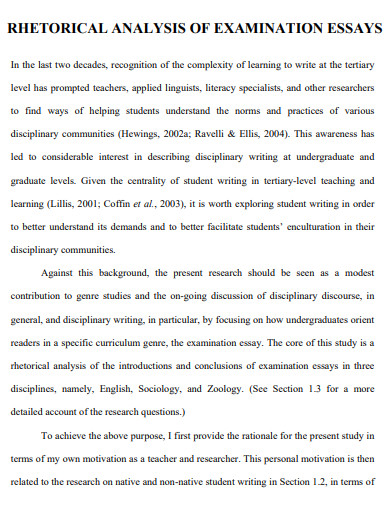
30. Standard Rhetorical Analysis Essay Example
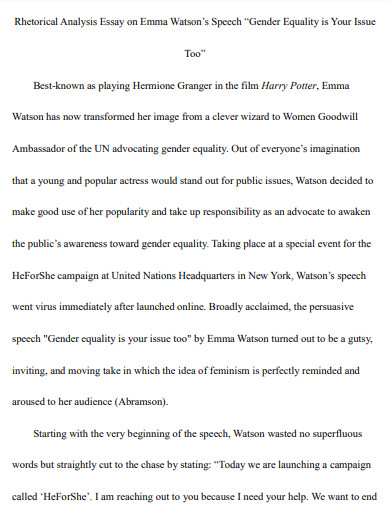
Size: 224 KB
31. Rhetorical Analysis Essay Rubric Example
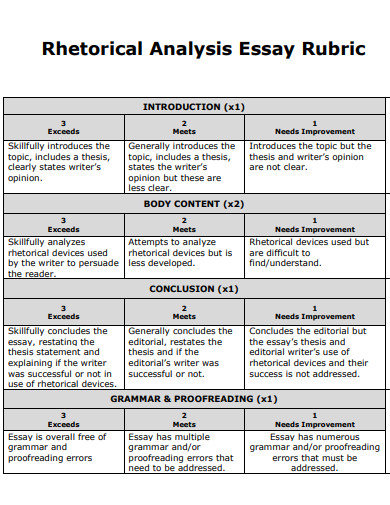
What Is Rhetorical Analysis Essay?
A rhetorical analysis essay is a type of essay one can write about which will dissect and explore the various contexts , themes , and tones of a non-fiction work or speech and determine the objective , goal, and effect it has on the audience. The essay can also establish various relationships between the rhetorical devices the person uses in their non-fiction work.
How to Write a Rhetorical Analysis Essay
A rhetorical analysis essay is essentially a deep dive into the various rhetorical aspects of a non-fiction work or speech. If one rhetorical analysis essay samples, examples, templates, and articles to act as a reference, then one can use the links in the sections above.
Step 1: Obtain a Recording Or Transcript of the Speech
Before you can write a rhetorical analysis essay, you must either obtain a recording, transcript, or the text of the non-fiction work you will write the essay on. This is important, as the rhetorical analysis essay will require a speech or text to dissect and read through.
Step 2: Outline the Rhetorical Analysis Essay You Will Write
After you have obtained the text or speech you will analyze in the essay, you must now provide an outline , outline format , or format for your rhetorical analysis essay. The outline will help provide a structure for your rhetorical analysis essay and keep an essential pace that will help you communicate your thoughts to the audience without any room for misunderstanding or misinterpretation.
Step 3: Make or Write the Rhetorical Analysis Essay
When you have finished working on the outline, you must now make or write the rhetorical analysis essay properly. You must ensure that there is a logical progression to your essay, which means that you must have a proper introduction, body, and conclusion .
Step 4: Evaluate the Contents of One’s Essay and Edit Accordingly
After you have finished writing your essay, you must evaluate all the contents of the essay. You can also opt to have someone proofread the contents of your essay and determine whether or not you can get your point across.
Why is it important to analyze speeches?
People contribute to our shared knowledge of rhetorics and speaking by analyzing and studying the various effects and attributes of people’s speeches and non-fiction work. Therefore, it is important to know and analyze the various aspects of successful and unsuccessful speeches as they can contribute to the world’s shared knowledge of rhetoric.
What are the elements of a rhetorical analysis essay?
A good rhetorical analysis essay incorporates the proper essay structure of having a good introduction paragraph, a body, and a concluding paragraph. Like most essays, the writer needs to understand the topic and have a basic understanding of the themes surrounding the subject of rhetoric.
What is the main difference between a rhetorical analysis essay and a normal essay?
A rhetorical analysis essay is not that different from a normal essay, which means both texts have the same fundamental parts and structure. The main difference between the two types of essays is in the topic, function, and analysis present in the body of the essay. A rhetorical analysis essay focuses on the writer’s analysis of a specific speech or text.
The rhetorical analysis essay is a subtype of essay that specifically focuses on the person’s objective interpretation of a specific non-fiction text or speech. A good rhetorical analysis essay allows the reader to understand the various effects speeches can have on their listeners or readers.
Text prompt
- Instructive
- Professional
Analyze the use of ethos, pathos, and logos in a famous speech for your Rhetorical Analysis Essay.
Discuss the rhetorical strategies used in a successful advertising campaign in your Rhetorical Analysis Essay.
- Affiliate Program

- UNITED STATES
- 台灣 (TAIWAN)
- TÜRKIYE (TURKEY)
- Academic Editing Services
- - Research Paper
- - Journal Manuscript
- - Dissertation
- - College & University Assignments
- Admissions Editing Services
- - Application Essay
- - Personal Statement
- - Recommendation Letter
- - Cover Letter
- - CV/Resume
- Business Editing Services
- - Business Documents
- - Report & Brochure
- - Website & Blog
- Writer Editing Services
- - Script & Screenplay
- Our Editors
- Client Reviews
- Editing & Proofreading Prices
- Wordvice Points
- Partner Discount
- Plagiarism Checker
- APA Citation Generator
- MLA Citation Generator
- Chicago Citation Generator
- Vancouver Citation Generator
- - APA Style
- - MLA Style
- - Chicago Style
- - Vancouver Style
- Writing & Editing Guide
- Academic Resources
- Admissions Resources
How to Write a Rhetorical Analysis Essay–Examples & Template
What is a Rhetorical Analysis Essay?
A rhetorical analysis essay is, as the name suggests, an analysis of someone else’s writing (or speech, or advert, or even cartoon) and how they use not only words but also rhetorical techniques to influence their audience in a certain way. A rhetorical analysis is less interested in what the author is saying and more in how they present it, what effect this has on their readers, whether they achieve their goals, and what approach they use to get there.
Its structure is similar to that of most essays: An Introduction presents your thesis, a Body analyzes the text you have chosen, breaks it down into sections and explains how arguments have been constructed and how each part persuades, informs, or entertains the reader, and a Conclusion section sums up your evaluation.
Note that your personal opinion on the matter is not relevant for your analysis and that you don’t state anywhere in your essay whether you agree or disagree with the stance the author takes.
In the following, we will define the key rhetorical concepts you need to write a good rhetorical analysis and give you some practical tips on where to start.
Key Rhetorical Concepts
Your goal when writing a rhetorical analysis is to think about and then carefully describe how the author has designed their text so that it has the intended effect on their audience. To do that, you need to consider a number of key rhetorical strategies: Rhetorical appeals (“Ethos”, “Logos”, and “Pathos”), context, as well as claims, supports, and warrants.
Ethos, Logos, and Pathos were introduced by Aristotle, way back in the 4th century BC, as the main ways in which language can be used to persuade an audience. They still represent the basis of any rhetorical analysis and are often referred to as the “rhetorical triangle”.
These and other rhetorical techniques can all be combined to create the intended effect, and your job as the one analyzing a text is to break the writer’s arguments down and identify the concepts they are based on.
Rhetorical Appeals
Rhetorical appeal #1: ethos.
Ethos refers to the reputation or authority of the writer regarding the topic of their essay or speech and to how they use this to appeal to their audience. Just like we are more likely to buy a product from a brand or vendor we have confidence in than one we don’t know or have reason to distrust, Ethos-driven texts or speeches rely on the reputation of the author to persuade the reader or listener. When you analyze an essay, you should therefore look at how the writer establishes Ethos through rhetorical devices.
Does the author present themselves as an authority on their subject? If so, how?
Do they highlight how impeccable their own behavior is to make a moral argument?
Do they present themselves as an expert by listing their qualifications or experience to convince the reader of their opinion on something?
Rhetorical appeal #2: Pathos
The purpose of Pathos-driven rhetoric is to appeal to the reader’s emotions. A common example of pathos as a rhetorical means is adverts by charities that try to make you donate money to a “good cause”. To evoke the intended emotions in the reader, an author may use passionate language, tell personal stories, and employ vivid imagery so that the reader can imagine themselves in a certain situation and feel empathy with or anger towards others.
Rhetorical appeal #3: Logos
Logos, the “logical” appeal, uses reason to persuade. Reason and logic, supported by data, evidence, clearly defined methodology, and well-constructed arguments, are what most academic writing is based on. Emotions, those of the researcher/writer as well as those of the reader, should stay out of such academic texts, as should anyone’s reputation, beliefs, or personal opinions.
Text and Context
To analyze a piece of writing, a speech, an advertisement, or even a satirical drawing, you need to look beyond the piece of communication and take the context in which it was created and/or published into account.
Who is the person who wrote the text/drew the cartoon/designed the ad..? What audience are they trying to reach? Where was the piece published and what was happening there around that time?
A political speech, for example, can be powerful even when read decades later, but the historical context surrounding it is an important aspect of the effect it was intended to have.
Claims, Supports, and Warrants
To make any kind of argument, a writer needs to put forward specific claims, support them with data or evidence or even a moral or emotional appeal, and connect the dots logically so that the reader can follow along and agree with the points made.
The connections between statements, so-called “warrants”, follow logical reasoning but are not always clearly stated—the author simply assumes the reader understands the underlying logic, whether they present it “explicitly” or “implicitly”. Implicit warrants are commonly used in advertisements where seemingly happy people use certain products, wear certain clothes, accessories, or perfumes, or live certain lifestyles – with the connotation that, first, the product/perfume/lifestyle is what makes that person happy and, second, the reader wants to be as happy as the person in the ad. Some warrants are never clearly stated, and your job when writing a rhetorical analysis essay is therefore to identify them and bring them to light, to evaluate their validity, their effect on the reader, and the use of such means by the writer/creator.

What are the Five Rhetorical Situations?
A “rhetorical situation” refers to the circumstance behind a text or other piece of communication that arises from a given context. It explains why a rhetorical piece was created, what its purpose is, and how it was constructed to achieve its aims.
Rhetorical situations can be classified into the following five categories:
Asking such questions when you analyze a text will help you identify all the aspects that play a role in the effect it has on its audience, and will allow you to evaluate whether it achieved its aims or where it may have failed to do so.
Rhetorical Analysis Essay Outline
Analyzing someone else’s work can seem like a big task, but as with every assignment or writing endeavor, you can break it down into smaller, well-defined steps that give you a practical structure to follow.
To give you an example of how the different parts of your text may look when it’s finished, we will provide you with some excerpts from this rhetorical analysis essay example (which even includes helpful comments) published on the Online Writing Lab website of Excelsior University in Albany, NY. The text that this essay analyzes is this article on why one should or shouldn’t buy an Ipad. If you want more examples so that you can build your own rhetorical analysis template, have a look at this essay on Nabokov’s Lolita and the one provided here about the “Shitty First Drafts” chapter of Anne Lamott’s writing instruction book “Bird by Bird”.
Analyzing the Text
When writing a rhetorical analysis, you don’t choose the concepts or key points you think are relevant or want to address. Rather, you carefully read the text several times asking yourself questions like those listed in the last section on rhetorical situations to identify how the text “works” and how it was written to achieve that effect.
Start with focusing on the author : What do you think was their purpose for writing the text? Do they make one principal claim and then elaborate on that? Or do they discuss different topics?
Then look at what audience they are talking to: Do they want to make a group of people take some action? Vote for someone? Donate money to a good cause? Who are these people? Is the text reaching this specific audience? Why or why not?
What tone is the author using to address their audience? Are they trying to evoke sympathy? Stir up anger? Are they writing from a personal perspective? Are they painting themselves as an authority on the topic? Are they using academic or informal language?
How does the author support their claims ? What kind of evidence are they presenting? Are they providing explicit or implicit warrants? Are these warrants valid or problematic? Is the provided evidence convincing?
Asking yourself such questions will help you identify what rhetorical devices a text uses and how well they are put together to achieve a certain aim. Remember, your own opinion and whether you agree with the author are not the point of a rhetorical analysis essay – your task is simply to take the text apart and evaluate it.
If you are still confused about how to write a rhetorical analysis essay, just follow the steps outlined below to write the different parts of your rhetorical analysis: As every other essay, it consists of an Introduction , a Body (the actual analysis), and a Conclusion .
Rhetorical Analysis Introduction
The Introduction section briefly presents the topic of the essay you are analyzing, the author, their main claims, a short summary of the work by you, and your thesis statement .
Tell the reader what the text you are going to analyze represents (e.g., historically) or why it is relevant (e.g., because it has become some kind of reference for how something is done). Describe what the author claims, asserts, or implies and what techniques they use to make their argument and persuade their audience. Finish off with your thesis statement that prepares the reader for what you are going to present in the next section – do you think that the author’s assumptions/claims/arguments were presented in a logical/appealing/powerful way and reached their audience as intended?
Have a look at an excerpt from the sample essay linked above to see what a rhetorical analysis introduction can look like. See how it introduces the author and article , the context in which it originally appeared , the main claims the author makes , and how this first paragraph ends in a clear thesis statement that the essay will then elaborate on in the following Body section:
Cory Doctorow ’s article on BoingBoing is an older review of the iPad , one of Apple’s most famous products. At the time of this article, however, the iPad was simply the latest Apple product to hit the market and was not yet so popular. Doctorow’s entire career has been entrenched in and around technology. He got his start as a CD-ROM programmer and is now a successful blogger and author. He is currently the co-editor of the BoingBoing blog on which this article was posted. One of his main points in this article comes from Doctorow’s passionate advocacy of free digital media sharing. He argues that the iPad is just another way for established technology companies to control our technological freedom and creativity . In “ Why I Won’t Buy an iPad (and Think You Shouldn’t, Either) ” published on Boing Boing in April of 2010, Cory Doctorow successfully uses his experience with technology, facts about the company Apple, and appeals to consumer needs to convince potential iPad buyers that Apple and its products, specifically the iPad, limit the digital rights of those who use them by controlling and mainstreaming the content that can be used and created on the device .
Doing the Rhetorical Analysis
The main part of your analysis is the Body , where you dissect the text in detail. Explain what methods the author uses to inform, entertain, and/or persuade the audience. Use Aristotle’s rhetorical triangle and the other key concepts we introduced above. Use quotations from the essay to demonstrate what you mean. Work out why the writer used a certain approach and evaluate (and again, demonstrate using the text itself) how successful they were. Evaluate the effect of each rhetorical technique you identify on the audience and judge whether the effect is in line with the author’s intentions.
To make it easy for the reader to follow your thought process, divide this part of your essay into paragraphs that each focus on one strategy or one concept , and make sure they are all necessary and contribute to the development of your argument(s).
One paragraph of this section of your essay could, for example, look like this:
One example of Doctorow’s position is his comparison of Apple’s iStore to Wal-Mart. This is an appeal to the consumer’s logic—or an appeal to logos. Doctorow wants the reader to take his comparison and consider how an all-powerful corporation like the iStore will affect them. An iPad will only allow for apps and programs purchased through the iStore to be run on it; therefore, a customer must not only purchase an iPad but also any programs he or she wishes to use. Customers cannot create their own programs or modify the hardware in any way.
As you can see, the author of this sample essay identifies and then explains to the reader how Doctorow uses the concept of Logos to appeal to his readers – not just by pointing out that he does it but by dissecting how it is done.
Rhetorical Analysis Conclusion
The conclusion section of your analysis should restate your main arguments and emphasize once more whether you think the author achieved their goal. Note that this is not the place to introduce new information—only rely on the points you have discussed in the body of your essay. End with a statement that sums up the impact the text has on its audience and maybe society as a whole:
Overall, Doctorow makes a good argument about why there are potentially many better things to drop a great deal of money on instead of the iPad. He gives some valuable information and facts that consumers should take into consideration before going out to purchase the new device. He clearly uses rhetorical tools to help make his case, and, overall, he is effective as a writer, even if, ultimately, he was ineffective in convincing the world not to buy an iPad .
Frequently Asked Questions about Rhetorical Analysis Essays
What is a rhetorical analysis essay.
A rhetorical analysis dissects a text or another piece of communication to work out and explain how it impacts its audience, how successfully it achieves its aims, and what rhetorical devices it uses to do that.
While argumentative essays usually take a stance on a certain topic and argue for it, a rhetorical analysis identifies how someone else constructs their arguments and supports their claims.
What is the correct rhetorical analysis essay format?
Like most other essays, a rhetorical analysis contains an Introduction that presents the thesis statement, a Body that analyzes the piece of communication, explains how arguments have been constructed, and illustrates how each part persuades, informs, or entertains the reader, and a Conclusion section that summarizes the results of the analysis.
What is the “rhetorical triangle”?
The rhetorical triangle was introduced by Aristotle as the main ways in which language can be used to persuade an audience: Logos appeals to the audience’s reason, Ethos to the writer’s status or authority, and Pathos to the reader’s emotions. Logos, Ethos, and Pathos can all be combined to create the intended effect, and your job as the one analyzing a text is to break the writer’s arguments down and identify what specific concepts each is based on.
Let Wordvice help you write a flawless rhetorical analysis essay!
Whether you have to write a rhetorical analysis essay as an assignment or whether it is part of an application, our professional proofreading services feature professional editors are trained subject experts that make sure your text is in line with the required format, as well as help you improve the flow and expression of your writing. Let them be your second pair of eyes so that after receiving paper editing services or essay editing services from Wordvice, you can submit your manuscript or apply to the school of your dreams with confidence.
And check out our editing services for writers (including blog editing , script editing , and book editing ) to correct your important personal or business-related work.

IMAGES
COMMENTS
A strong thesis statement for a rhetorical analysis is NOT… A simple statement of your topic A broad statement A statement of facts or statistics A summary of the author’s essay you are analyzing A statement of what you’re going to do in the essay Examples of weak rhetorical analysis thesis statements:
Thesis Statement Example for Rhetorical Analysis Essay A thesis statement of a rhetorical analysis essay is the writer’s stance on the original text. It is the argument that a writer holds and proves it using the evidence from the original text.
Nov 20, 2024 · The structure of a rhetorical analysis essay includes an introduction (introducing the text, providing background, and including a thesis statement), body paragraphs (examining the rhetorical strategies closely by examining the evidence provided in the text), and a conclusion (summarizing the analysis and reflecting on the impact of the text).
Aug 28, 2024 · A rhetorical analysis thesis statement is a concise and focused assertion that encapsulates the main argument or interpretation you intend to explore in your rhetorical analysis essay. It serves as a roadmap for your readers, outlining the key elements you will examine within the text, such as the author’s use of rhetorical devices ...
Feb 13, 2015 · Transition and topic sentence about fourth point from thesis; Quote illustrates how the author uses appeal to ethos; Analysis explains how quote supports thesis; Conclusion returns to the ideas in the thesis and further develops them; Last sentence returns to the hook in the introduction; Learn more about the "Rhetorical Analysis Graphic ...
A strong thesis statement for a rhetorical analysis is NOT… A broad, simple statement of your topic A statement of facts or statistics A summary of the author’s essay you are analyzing A statement of what you’re going to do in the essay Examples of weak rhetorical analysis thesis statements:
Feb 13, 2015 · Analysis explains how the quotes show the effective use of pathos, as noted in the thesis Analysis explains how the quotes show the effective use of ethos, as noted in the thesis Quote that illustrates appeals to logos Quote that illustrates appeals to logos Transition and topic sentence about the second point from the thesis Quotes that
Mar 10, 2023 · Good Rhetorical Analysis Essay Examples. When writing a rhetorical essay, examples help the readers to understand things in a better way. They also help a writer to compose an essay just like professionals. Here are some amazing rhetorical analysis examples on different topics. Use them as a helping hand to understand the concept and write a ...
Aug 21, 2024 · A rhetorical analysis essay is not that different from a normal essay, which means both texts have the same fundamental parts and structure. The main difference between the two types of essays is in the topic, function, and analysis present in the body of the essay. A rhetorical analysis essay focuses on the writer’s analysis of a specific ...
Mar 15, 2024 · Like most other essays, a rhetorical analysis contains an Introduction that presents the thesis statement, a Body that analyzes the piece of communication, explains how arguments have been constructed, and illustrates how each part persuades, informs, or entertains the reader, and a Conclusion section that summarizes the results of the analysis.